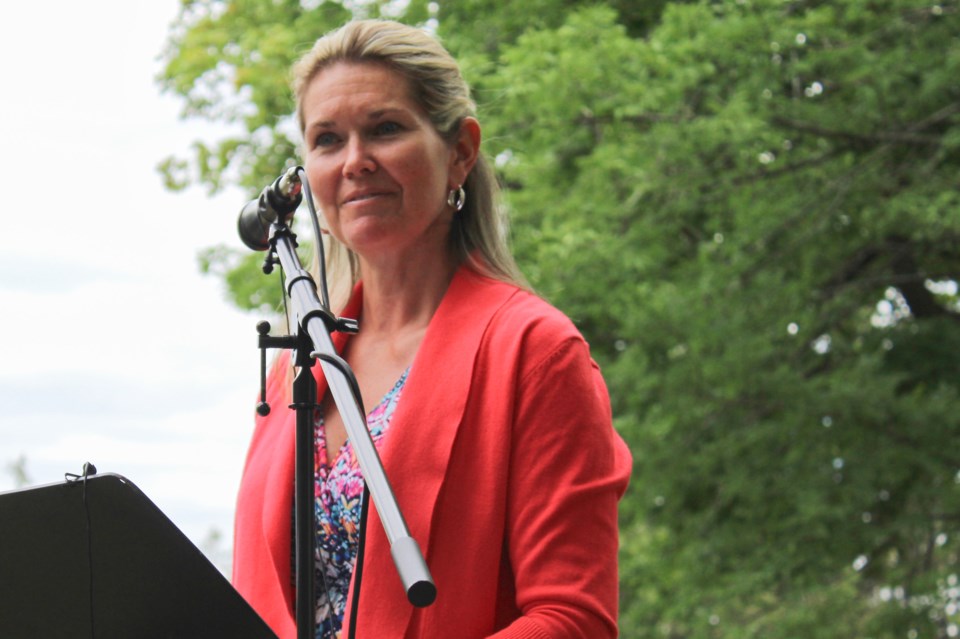Looking back on the year that was, Simcoe North MPP Jill Dunlop saw a 2019 that was full of progress and a few challenges.
Asked what stood out as a highlight of the year, Dunlop was quick to mention her appointment in June as associate minister of children and women’s issues.
“It was very exciting,” she said. “It’s something I think every MPP hopes for in their career. At the same time, you work hard for your riding.”
The experience has been an eye opener, she added.
“Since being appointed, I’ve never seen as much of my province and country than I have in the past six months,” she said. “It gives you a real appreciation of what people in your own riding are doing, too. It’s really given me something to dig my teeth into and work on.”
Dunlop’s provincial responsibilities have given her a chance to tighten her focus on matters that have been important to her since she was campaigning, including skilled trades.
With only four per cent of the trades being represented by women, Dunlop sees an opportunity for her ministry to address that.
The introduction of trades education as early as kindergarten should also help, she added.
While listing some of the accomplishments of the government in the past year, the province’s efforts to reduce red tape stood out to the MPP, who praised the passing of Bill 132, the Better for People, Smarter for Business Act.
“All of our ministries are looking for ways to reduce red tape,” she said. “Since we took government in June 2018, there have been 271,600 jobs created in Ontario.”
Dunlop also mentioned the many announcements she has been able to make in the riding, unveiling funding for health care, infrastructure and transit.
“There are lots of good things going on, and kudos to our community,” she said.
It hasn’t been all smooth sailing for Dunlop. Her Progressive Conservative government has taken a lot of heat for its handling of autism supports, changes to the elementary health curriculum and post-secondary education. Those issues have led to protests outside her constituency offices.
When the province unveiled its autism plan, pushback from families and professionals ultimately led the government to backtrack.
“We were looking at getting children off the wait list,” Dunlop said, noting 75 per cent of those on the autism spectrum who were on that list were not receiving support.
However, the government quickly learned that approach “didn’t go over well.”
“We heard very loud and clear that people wanted a needs-based system,” Dunlop said.
The province formed an expert panel that included families, professionals and those with lived experience to make recommendations, which are being looked at by the government.
“I don’t think there’s anything wrong with going back and saying it wasn’t the right move,” she said. “I’m happy with how we responded to it.”
The province also responded, in a way, to criticism over its handling of the elementary health curriculum, largely as it relates to sexual education. After scrapping the curriculum created by the previous, Liberal government, the PCs introduced their own, and it wasn’t as different as some had expected.
Dunlop defended her government’s approach, which included broader consultation with the public. More than 75,000 people responded to an online consultation.
“People didn’t feel that the curriculum the Liberals put in place was age appropriate in some areas,” she said.
For example, students will now start learning about gender identity and sexual orientation in Grade 8 rather than Grade 6.
Dunlop noted the PCs are also looking at making some concessions when it comes to online learning. They had planned to introduce four mandatory online courses for high school students but are now considering lowering that requirement to two.
“We’re hearing from employers and post-secondary that online learning is the way of the future,” she said.
There have been some controversial moves on the post-secondary front, too, including giving students the ability to opt out of certain student fees considered “non-essential.”
“I look at it as a parent,” Dunlop said, noting she has two daughters in university. “I looked at what those ancillary fees were.”
She felt students should be able to opt out of paying for some services they would not be taking advantage of while at school.
“All these fees add up. I looked at it as a chunk of money my kids could pay into or not,” she said.
An Ontario court struck down those changes, but the province is appealing.
With an eye to the new year, Dunlop is excited about some of the province’s areas of focus and how they might benefit local communities.
“We’ve been looking at increasing expansion of natural gas and broadband. Those are two key things I’ll be looking at,” she said. “Those things will bring business to the area.”
Dunlop lives in an area with slow internet speeds, and she wants to make sure other such areas in the riding “are high on the priority list as expansion areas.”
She also expects to see some movement on the government-owned property of the former Huronia Regional Centre (HRC) in Orillia. The province is working with the city and Infrastructure Ontario to look at opportunities for the sprawling lakeside site.
The province has a goal to create 15,000 new long-term-care beds. More than 7,000 have been announced so far, and “sites like the HRC are great opportunities for housing and long-term care in this area,” Dunlop said.
“We’re not just going to continue to pay for properties that are sitting there empty.”
She couldn’t say for sure when details of the province’s plans for the property might be released, but said she would “love to be making an announcement this summer, saying we’re moving ahead with something.”



